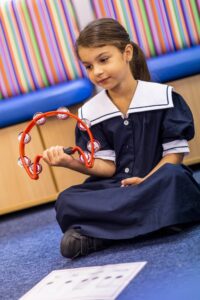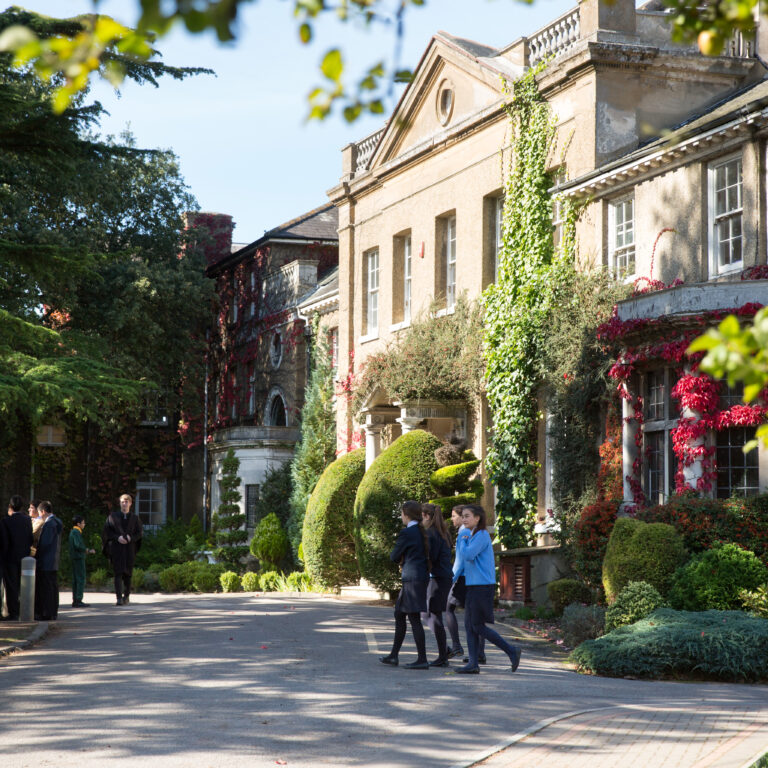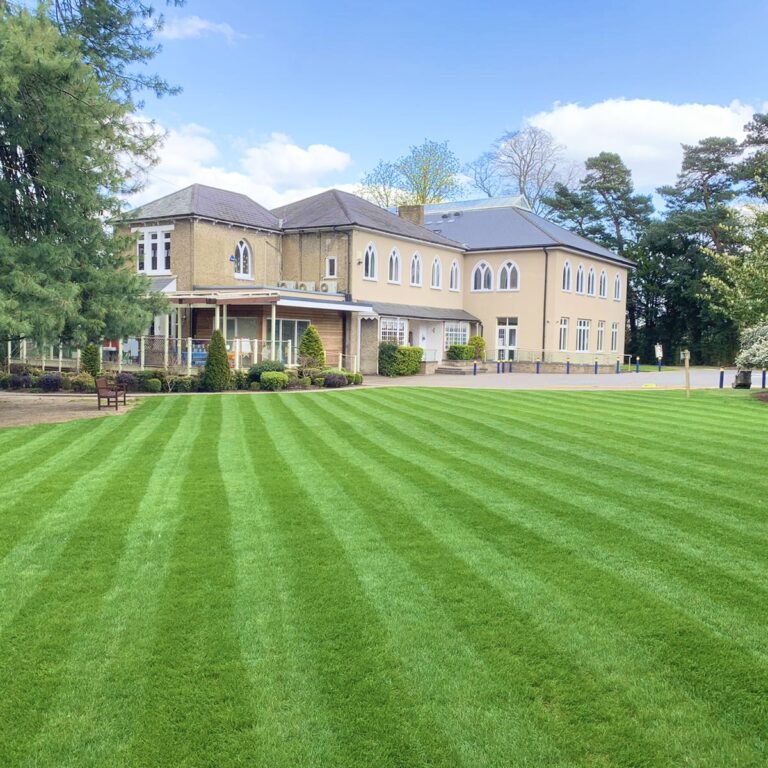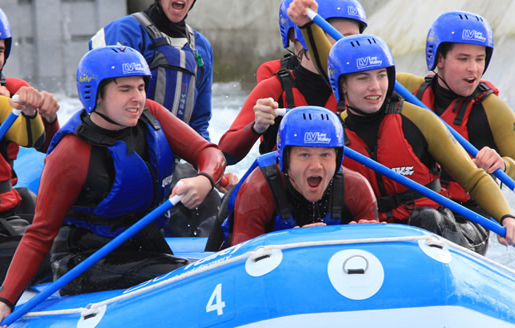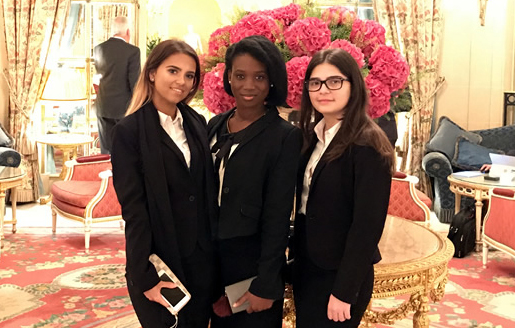Prep Academics
English
Our school is committed to attaining the highest standards in this subject as our results at our 2022 SATS exams and subsequent standardised tests demonstrate.
We begin at the Foundation Stage as we mean to go on, introducing a variety of schemes to secure a good grounding in reading and writing and speaking and listening so that all our pupils may begin to communicate successfully both orally and in written forms very quickly.
We follow the National Curriculum but we also aim to attain competence and in time excellence, at a broader spectrum of challenges, which include Common Entrance Examinations, the full range of LAMDA exams, a subject taught as a class activity from Y1 to all our pupils, and internal public speaking assignments, which include Bible readings and individually assigned presentations at our weekly Assemblies.
This is a lively department, dedicated to developing each pupil’s awareness and enjoyment of language, guiding them towards independence so that they begin to initiate and evaluate learning through a variety of literature and non-fiction writing, ranging from newspaper articles to exploring a variety of research material.
Imagination, inventiveness and critical awareness are only a few of the rewards on offer, thanks to the commitment and enthusiasm of the specialist teachers, who begin their hard work in our Pre-Prep Department.
Key Stage One results and subsequent standardised tests in the subject are equally impressive.
Enrichment
English as a subject also benefits by a comprehensive programme of visits, aimed to introduce the children to a variety of experiences which in turn challenge and shape
their communication skills. Visiting authors and theatre visits are a regular feature of the school.
Drama is introduced as a subject in our Pre-Prep Department and is further developed through a range of presentations during the year, culminating to a full-
scale production in December for our younger pupils (Pre-Prep – Y2) and a summer production for pupils in the Junior Section of the school (Y3 – Y6). Teamwork is an
important aspect of life at St. John’s and there is no better place to learn these skills but on the stage. All pupils participate, which makes the whole experience very
worthwhile and enjoyable.
Transition Classes
Y6 pupils attend additional English classes led by Senior School teachers, who extend the children’s understanding of what is expected of them in this subject when
they join our Senior School or move on to secondary education in a variety of other schools. The foundation is laid to enable pupils to continue to enjoy their studies as
they face new challenges in Y7 and beyond. Pupils are often surprised to discover how far indeed they have come and they leave the Prep School with a renewed
confidence that will stand them in good stead at secondary school.
Mathematics
MATHEMATICS AT ST. JOHN’S PREPARATORY SCHOOL
 Aims
Aims
Mathematics is essential to everyday life, critical to science, technology and engineering, and necessary for financial literacy and most forms of employment. At St. John’s our aim is to give our pupils a high-quality mathematics education which will provide them with a foundation for understanding the world, the ability to reason mathematically, an appreciation of the beauty and power of mathematics, and a sense of enjoyment and curiosity about the subject. We want our pupils to enjoy mathematics to the fullest possible extent.
EARLY YEARS FOUNDATION STAGE:
Mathematics is an important part of learning for all children in our Nursery and Reception classes and we believe that by providing practical opportunities for our youngest pupils to develop and apply their mathematical knowledge they can be motivated to think critically and begin to solve everyday problems through applying their learning to new experiences. We also believe that developing a strong grounding in number is essential so that all our children gain the necessary building blocks to excel mathematically. In addition, our curriculum includes rich opportunities for children to develop their spatial reasoning skills across all areas of mathematics including shape, space and measures.
KEY STAGE 1:
Our core scheme derives from the widely used White Rose maths schemes of learning, while many supplementary resources are used both to support, extend and enrich learning. By using a wide range of methods, maths is taught in such a way as to engage, interest and inspire, offering support and challenge giving each child the opportunity to reach their full potential. Our main focus at Key Stage 1 is to ensure that pupils develop confidence and mental fluency within whole numbers, counting and place value and also to begin to embed these skills in their problem solving. This involves working with numerals, words and the four operations. Children are encouraged to use mathematical vocabulary when discussing different topics.
KEY STAGE 2:
Our children continue strengthening their knowledge and understanding of the four operations and apply this knowledge in a variety of ways by solving problems and completing a variety of investigations through our core scheme of ‘Target Maths’. Once again, this scheme is supplemented by many other resources which are used both to support, extend and enrich learning. At St. John’s, we acknowledge the importance of children being able to apply mathematical knowledge to real life experiences; it is essential, therefore, that children develop strong mental maths skills and our daily maths practice sessions are designed to help them achieve this.
TRANSITION TEACHING:
In year 6, our pupils are taught for one lesson a week by a Senior School maths teacher to aid their transition to Year 7 at the end of the academic year. We find this beneficial for our pupils because the pupils:-
Are able to get to know the senior school teachers, and the type of learning they can expect.
The senior school will already know about the children who are coming to them: their academic ability, their strengths, areas that may need support and also about any children who need additional transition for a range of reasons.
WORKSHOPS & VISITS:
School trips provide the opportunity for pupils to immerse themselves in new, different and exciting environments where learning is less formal – but sometimes more powerful – and a recreational element threads through their day. Our pupils can learn well in a classroom environment and we arrange many enrichment activities for them which can benefit and reinforce their learning, whilst acting as a practical supplement and extension to the theory that pupils already know. It is easier to illustrate complex concepts in a real-world context, especially when there are experts on hand to give workshops or talks about particular subjects. Taking learning outside of the classroom and into real life sparks excitement and curiosity, imagination and creativity. All of these things translate into a renewed interest in the subject taught, and increase motivation and engagement when they are back in the classroom. Many of the workshops / visits we offer, although not mathematical in nature, have mathematical connections embedded within them.
Some of the mainly Maths-based workshops and visits we offer our pupils are:-
- World of Maths Workshops – all year groups.
- Maths Shapes workshop for the younger pupils.
- Mobile Planetarium Visit.
Finally, across all year groups, we have high expectations of all our pupils, and they in turn develop high expectations of themselves. We believe that in learning mathematics our children are developing a ‘powerful way of communicating’. Mathematics is effectively a language, containing technical terminology, distinctive patterns of spoken and written language, a range of diagrammatic devices and a distinctive way of using symbols to represent and manipulate concepts. Children use this language to articulate their observations, to explain and in time to justify or prove their conclusions in mathematics. However, we understand that no two students are alike, and so our ethos is one of nurture and care – supporting each pupil to make the most of their abilities.
Science
“The important thing is to never stop questioning or learning.”
Albert Einstein
Aims
At St. John’s Preparatory School, we provide a primary science curriculum that fosters a healthy curiosity in pupils about our universe and promotes respect for the living and non-living. We believe science encompasses the acquisition of knowledge, concepts, skills and positive attitudes.
Curriculum
The Nursery and Reception classes deliver science content through the ‘Understanding of the World’ strand of the EYFS curriculum. Children are encouraged to make sense of the world through exploration and observation of the environment. Exciting opportunities are provided, which include internal visits to the nature garden and observing chicks hatching in an incubator in the classroom, as well as a variety of external visits.
During their time at St. John’s Preparatory school, our carefully sequenced curriculum ensures pupils develop scientific knowledge and conceptual understanding through the specific disciplines of biology, chemistry and physics. They are taught scientific enquiry that helps them to answer scientific questions about the world around them while developing a sense of excitement and curiosity. Children are encouraged to understand how science can be used to explain what is occurring, predict how things will behave and understand the uses and implications of science today and for the future. They become familiar with and use technical terminology accurately and precisely.
We ensure that the Working Scientifically skills are built-on and developed throughout pupils’ time at the school so that they can apply their knowledge of science when using equipment, conducting experiments, building arguments and explaining concepts confidently, continue to ask questions and be curious about their surroundings.
Enrichment Opportunities
Their science journey is enhanced further through visits from science workshops and a variety of external visits.
To continue their science journey and to ensure a smooth transition to secondary school science, the children in Year 6 have weekly lessons with teachers from the senior school, as well as opportunities to carry out investigations in fully equipped science laboratories.
At St. John’s Preparatory School our intent is to create outstanding scientists and inventors of the future.
Computing
“If I have seen further, it is by standing upon the shoulders of giants.”
Albert Einstein
Aims
At St. John’s Preparatory School, our core aim for pupils, upon completion of the curriculum, is for them to be digitally literate so that they can express themselves and develop their ideas through information and computer technology, at a level that is suitable for the future workplace and as active participants in an ever-advancing technological world.
At St. John’s Preparatory School, we provide all pupils with a supportive and challenging learning experience that balances all aspects of IT and computing. The curriculum is delivered by a qualified computer scientist and CEOP ambassador. With technology playing such a significant role in society today, we aim to equip all students with the practical and creative abilities to design, produce and evaluate as well as becoming digitally literate across all subjects and areas of school life. We believe that these are skills that pupils must be taught if they are to be able to participate effectively and safely in a digital world.
Curriculum
At St. John’s the taught curriculum consists of three strands;
Computer Science
The computer science strand promotes skills in computational thinking and programming using the languages of Block and Text-based coding through applications such as Scratch, Logo, Code for Life, Minecraft, Kodu, Crumble and Lego Robotics. It teaches children how to analyse, design and debug their own programs. This develops their problem solving and critical thinking skills, which can be applied to other subject-areas and forms the basis for their future studies.
Information Technology
Information Technology teaches children to recognise the importance of technology in their everyday life. The pupils understand the difference between hardware and software allowing them to develop skills, which can be applied across a range of technologies and platforms such as Google Workspace, Tinker CAD, Microsoft 365, Computers, iPads, Micro-Controllers, Cameras and Robotics.
Digital literacy
Digital Literacy strand teaches students how to be effective users of digital technology and efficient in its use in the real world. It is here where the pupils’ creativity and responsibility combine to produce work that expresses their individuality and ideals as they explore the world around them. Digital Literacy is predominantly about the safe and responsible use of technology, including recognising its advantages for collaboration, communication and becoming a respectful digital citizen.
Facilities
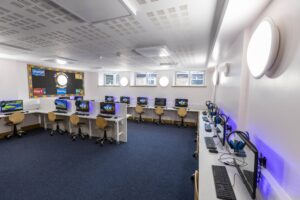
Enrichment Opportunities
Pupils are empowered to develop their individual talents through a range of enrichment opportunities such as;
- UK Bebras Computational Thinking Challenge
- Lego Robotics workshops
Sharing these achievements with the wider community whilst ensuring they can negotiate these safely and responsibly.
Geography
“Geography is a subject which holds the key to our future”
Michael Palin
Aim
At St. John’s Preparatory School our core aim for pupils is to inspire their curiosity and fascination about the world around them. We aim to develop their understanding of Human, Physical and Environmental geography, allowing them to formulate their own ideas.
Thinking geographically offers a uniquely powerful way of seeing the world and making connections from local to global, between environmental, physical and human. We need facts in order to understand, but require concepts to deepen our knowledge further.
Curriculum
The children in the EYFS are taught geography through the general topic, Knowledge and Understanding of the World.
In KS1 and KS2 we study the three main organisational concepts of Geography: place, space and environment. The curriculum aims to provide contextual knowledge of places (including locational knowledge) and understanding of physical and human processes. There is a significant emphasis on developing geographical skills through the use and communication of data, especially through fieldwork; interpreting maps, diagrams, globes, communicating and writing at length. It is important that pupils deepen their understanding of the interaction between physical, human and environmental processes and the formation and use of landscapes and environments.
From Year 1 to Year 6, geography is taught weekly through a range of pedagogical approaches, which provides the pupils with opportunities to develop their geographical skills and become confident global citizens.
Topics covered include;
- Local Area Studies – Potters Bar
- Regional Area Studies – Whitby, Dartmoor, Sheringham
- Continents and Countries around the world – Africa (Kenya), South America (Ecuador), Europe (Russia, Germany, Netherlands), Asia (China, India)
- Biomes and Climate Zones – Rainforests, Jungle, Arctic and Antarctic, Mountains, Coastal Areas, Weather
- Physical Geography – Land Formations, Coastal Erosion, Rivers, Mountains
- Human Geography – Trade, Natural Resources, Sustainability, Coastal Defences
- Climate Change
Enrichment Opportunities
The pupils geographical education is furthered through enrichment opportunities such as:
- Fieldwork
- Workshops
- Off-site excursions
History
“History fires pupils’ curiosity about the past in Britain and the wider world.”
Aims
At St John’s Preparatory School our high-quality history education will encourage pupils to gain a coherent knowledge and understanding of Britain and the wider world. We aim to inspire them to develop a fascination for the past and how it has influenced the present. As pupils move through the curriculum they will develop a chronological framework for their knowledge of people and events. They will see the diversity of human experience and will understand more about themselves as individuals and members of society.
In our history education, pupils will learn to enquire, research, find evidence and assess it. They are encouraged to make their own judgements therefore allowing them to argue for their point of view. These skills, which are prized in adult life, can more importantly influence their own decisions about personal choice, attitudes and values.
Curriculum
Units of work are diverse and are studied in chronological order from Year 1 to Year 6. Lessons consist of a balance of knowledge acquisition and skills learning.
Key Stage 1
Pupils should develop an awareness of the past, using common words and phrases relating to the passing of time. This includes: changes within living memory, events beyond living memory that are significant nationally and globally, the lives of significant individuals in the past who have contributed to national and international achievements and historical events, people and places in their own locality.
Key Stage 2
Pupils continue to develop a chronologically secure knowledge and understanding of British, local and world history, establishing clear narratives within and across the periods they study. Pupils focus on the changes in Britain from the
- Stone Age to the Iron Age
- Ancient Greece
- The Roman Empire
- Anglo Saxons
- The Vikings
- The Tudors
Pupils learn about the achievements of some of the earliest civilizations that provides contrasts with British History where they are introduced to the different periods and their reigning monarchs.
Enrichment in History
Visits to museums and other places of historical interest are arranged for appropriate year groups to further stimulate and encourage an interest in the past.
Visiting historians and experts are invited into the school to deliver a variety of theme based workshops, according to units being covered.
Through these many experiences, our pupils build up a better understanding of the past, its influence on the present and of their own place within society.
P.E
Aims
Physical Education at St. John’s Preparatory School is taught by highly qualified, specialist teachers with a passion for sport and an enthusiasm to deliver the highest quality lessons that inspire young people at St. John’s School. Sport forms a key part of the pupils’, physical, social, and mental well-being, as well as supporting their physical development. As a department, we aim to provide a range of experiences, in a range of sports, to allow pupils access to a positive environment where they can learn, develop, and enjoy playing sport at school. These positive experiences provide pupils with the knowledge and understanding of how to live a healthy, active lifestyle, and leads to continued enjoyment throughout their lives, as they embark on their individual journeys once they leave.
Curriculum
Lessons begin in Pre-Prep (EYFS) and carry through to F3 (Y6), where a structured and developmental scheme of work is followed to allow for progression of skills, different levels of challenge and a sense of achievement. As a department, we work to empower all pupils by allowing them to take responsibility for their own learning, and as a result enable pupils to develop skills such as, but not restricted to, confidence, independence, creativity self-management and reflection. In addition, the department also promote interpersonal skills and qualities into lessons, including, teamwork, commitment, fairness, respect, and equality, which will support lifelong learning.
In KS1, there is a focus on fundamental skills such as throwing, catching, running, jumping, and hopping as well as introductions into team sports such as football, netball, hockey, and basketball, whilst Year 1 pupils also take part in swimming lessons.
In KS2, the pupils continue their development of team sports and participate in football, netball, basketball, and hockey whilst also being introduced to individual sports like gymnastics, tennis, athletics, and fitness, whilst also resuming their swimming lessons.
Enrichment Opportunities
St. John’s offers an extensive extra-curricular timetable with clubs being made available to all year groups throughout the academic year.
The Lower School, Pre-Prep to Lower Transitus, are offered lunch-time clubs which consist of multi-sports, football, netball, hockey, athletics, and yoga. Whilst the upper school, Year 3 to Year 6, are offered after-school activities such as football, netball, hockey, basketball, rounders, tennis, athletics, cross-country, yoga, and fencing.
We also offer competitive fixtures in a number of sports including but not exclusive to, football, netball, cross-country and rounders. The pupils have the opportunity to compete at different levels from Inter-school events, Borough, Regional and National competitions. All St. John’s pupils represent the school with pride, passion and a great respect for the sport and their opponents.
Facilities
Pupils in the Preparatory School have full access to our Senior School site for their P.E. lessons, where we boast a state-of-the-art football pitch, as well as a large second sports field. As well, we have an excellent outdoor multi use sports area. It has been designed using a Tiger Turf Pro surface, providing an outstanding facility for our pupils to play Hockey, Tennis, Netball and 5 aside football. We also have a recently refurbished outdoor basketball court and a state of the art Sports Hall with luxurious changing rooms, incorporating showers and disability facilities . In addition to the Senior School facilities, the pupils also have access to the following facilities at the Prep. School during lunch and break as well as during their P.E. lessons
- one grass football pitch
- a recently refurbished tennis court, which also consists of netball markings for one court
- a large playing field, which is bordered by a small woodland area.
Pre-Prep and Prep 1 classes also have access to an enclosed astro-turf play area, which comprises of engaging apparatus and equipment to assist with the development of pupils’ gross motor skills.
Art and Design
Aims
At St. John’s we strive to be progressive and dynamic. Pupils are taught in small class sizes to afford them the opportunity to develop key skills in Art. The lessons are robust and are geared to address the individual child. Art is taught across the school by specialists in the subject.
Curriculum
Early Years
Classes are taught in response to their environment, extending their knowledge and understanding of the world around them. Exploration and investigation play a huge role in the foundation stage art lessons and the pupils have an opportunity to work in doors as well as outdoors in Art developing their individual responses and ideas.
Key Stage 1
The pupils start to develop more formal approaches to art. The introduction of key skills and a variety of mediums helps in promoting their ideas and responses. Art history lessons are taught through stories and the exploration of artists and craft people. Year 1 & 2 look closely at line drawing, pattern and texture throughout the year and have the opportunity to explore basic sculpture and textile design both on small and large scales. It is an ambitious programme but one that we feel is integral in challenging children to reach their full potential.
 Key Stage 2
Key Stage 2
Projects include drawing from primary observation and learning to record elements in art, such as tone, form, texture, space and line. Pupils also work imaginatively and learn about design and visual concepts. A range of media is covered each year including printing, painting, drawing, collage, clay, wire, papier-mâché, textile design and 3D work. The art lessons are divided into modules and at the start of each module the children are introduced to historical and influential art movements and artists associated with their module of work.
Our facilities provide a spacious area for the children to study all forms of art. It is a light and creative space that encourages creativity on a large and small scale. Our specialist art teachers and art technician are inspirational and encourage a child’s curiosity and interest in Art. They work hard to bring in current trends while maintaining traditional concepts where learning skills and technique is of the utmost importance. They push boundaries and inform the pupils of artists, who have an impact in the wider community. The art room can be a quiet and reflective space where the children are encouraged to concentrate or it can be a noisy robust environment, where our colourful and creative learning wall is on display and children are discussing and collaborating with each other.
The Enrichment Opportunities
- The curriculum allows the pupils to express themselves with different mediums, they all work towards the bi-annual art exhibition where every child’s art is on display.
- Art competitions are entered yearly.
- The children also participate in gallery visits and inhouse workshops.
- The collaboration of the Music and Art departments is a tremendous affair where both departments have the opportunity to collaborate in the annual Arts Festival, where the pupils participate in music and art workshops and create celebrating the importance of different musical and artistic achievements.
- An annual art magazine showcases and highlights the achievements of the pupils’ art and the development of art across the school, so that parents and the wider community can share in the achievements of our department.
Drama
At St. John’s an extensive range of Enrichment Activities is provided for students to enhance learning that has taken place in the classroom. These activities help students to make accelerated progress, attain more highly, develop important personal skills and attributes and to enjoy their studies.
Our Enrichment and Extra-Curricular Programme runs throughout the school year, offering students additional opportunities and experiences beyond the school day.
Parents/carers are asked to support the school by ensuring that their child takes part in enrichment and extra-curricular activities at every opportunity.
St. John’s offers Drama as part of a timetabled lesson each week and pupils also have the chance to take part in the drama club on a weekly basis, which inspires them to explore their individual selves and to grow over the course of the academic year. The Acting club programme is offered to the elite pupils of years 5 and 6, primarily working towards LAMDA Acting examinations. These pupils must be able to manage their time scrupulously, as the requirements are additional to any mandatory LAMDA.
A place of trust, enjoyment and creativity, our aim is to plant the seeds of a solid foundation in order to motivate pupils and train them in how to move and speak, whilst experimenting with different characters and themes.
All pupils in Pre-Prep -F3 (nursery-year6) have lessons in Drama on their timetable. Years 1-6 work towards their annual LAMDA (London Academy of Music and Dramatic Art) examinations with a lesson incorporated into their timetable.
Pupils work collaboratively in every lesson, developing their confidence, team building, listening, speaking and analytical skills.
Music
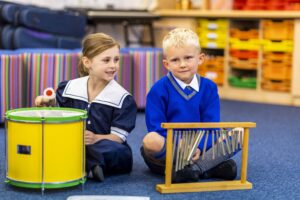
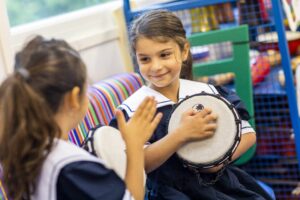
Early Years:
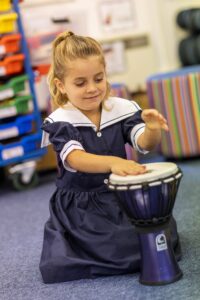
Key Stage 1 Years 1&2 (Prep. 2 – Lower Transitus) :
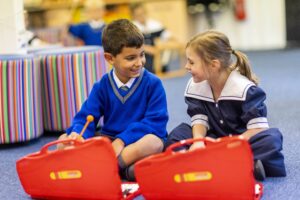
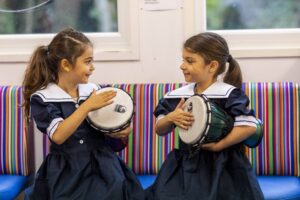
Key Stage 2 – Years 3-6 (Upper Transitus – Form 3):
Pupils in the upper school have three music lessons a week. Firstly a singing lesson – because pupils will always require their voices, whichever future they have and so to be able to explore the limits and extent of the voice is highly important. Pupils are taught about how to breathe and how to stand properly, in order to make the best use of their voices and make their voices project. Pupils are also taught a variety of musical elements through song, such as harmony and counterpoint, part-singing and how to perform parts independently within a larger piece.
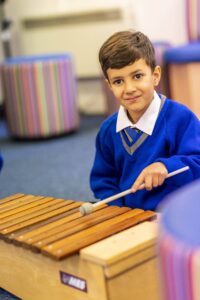
Lastly, where pupils have been offered the opportunity to learn a musical instrument in the lower school, this is continued in the upper school. Pupils learn to play the violin for a further year in Year 3 (Upper Transitus), followed by the viola (and therefore a new note system) in Year 4 (Form 1). Pupils in year 5 (Form 2) are taught how to play the flute, which uses similar fingers to the recorder, but uses different technique and breath control. In their final year of Prep. School, pupils are taught how to play chords through playing the Ukulele and how to develop music through composition.
Facilities:
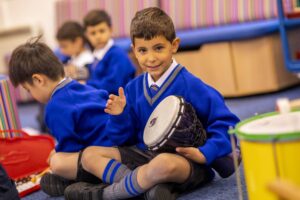
Most pupils in the school receive two to three music lessons a week dependent on their age. This is not counting individual instrumental lessons, which are arranged privately.
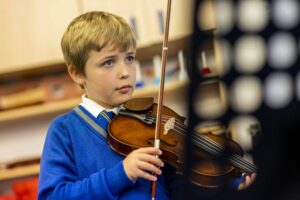
PSHE
PSHE in Key Stages 1 & 2
Personal, Social, Health and Economic (PSHE) Education is a planned programme of learning through which children acquire the knowledge, understanding and skills they need to manage their lives both now and in the future. As part of a whole-school approach, PSHE Education develops the qualities and attributes pupils need to thrive as individuals, family members and members of society.
PSHE Education is central to the education of all children at St. John’s Preparatory School and permeates all aspects of life in school. We have embraced the Jigsaw scheme of work, which embodies a positive philosophy to nurture children’s development as compassionate and well-rounded human beings, as well as building their capacity to learn. Jigsaw brings together PSHE Education, compulsory Relationships and Health Education, Sex Education, (Years 5 and 6 only) emotional literacy, mindfulness, social skills and spiritual development.
The Preparatory School PSHE curriculum takes a thematic approach, covering six core themes of ‘Being in My World;’ ‘Celebrating Difference’; ‘Dreams and Goals;’ ‘Healthy Me; ‘Relationships’ and ‘Changing Me’ over three terms. In the Prep School, PSHE is taught in weekly 50-minute lessons in Key Stage One and Two.
Key Stage 1 & 2
Aims:
- To help children acquire the knowledge, understanding and skills they need to manage their lives both now and in the future.
- To develop skills to address the changes that they experience, including the transition to secondary school in Year 6.
- To grow the qualities and attributes they need to thrive as individuals, family members and members of society.
Content:
At Key Stages 1 & 2 our PSHE curriculum is designed to prepare the children for the opportunities, responsibilities and experiences of later life. It promotes spiritual, moral, cultural, mental and physical development as well as British values.
| Curriculum |
| Being Me in My World |
|
| Celebrating Difference |
|
| Dreams and Goals |
|
| Healthy Me |
|
| Relationships |
|
| Changing Me |
|
Enrichment
PSHE is led by an experienced subject specialist in the Senior School who works in partnership with the Preparatory School Lead, the School Counsellor, the Designated Safeguarding Leads, and teachers to support all pupils.
- Independent advisors and speakers contribute to enriching the curriculum further and bringing the subject to life.
- Assemblies to celebrate cultural events and religious celebrations
- Trips and workshops
- Fund raising for various charities
- Plays and concerts to encourage team building
- Our School Council, involving pupils from Year 3 to Year 6, and the system of Monitors and House Captains in Year 6, help to develop a sense of responsibility to the community, an idea of service to others as well as a sense of democracy.
LAMDA
Founded in 1861, LAMDA is the oldest drama school in the UK. LAMDA has been offering speech and drama examinations for over 130 years and since then, the organisation has built and developed a reputation for delivering excellence in the provision of Communication and Performance examinations.
AIMS
At St. John’s Preparatory School, the pupils from years 1-6 participate in a LAMDA lesson on a weekly basis. Each pupil will work towards a specific grade in the Communication syllabus, largely working towards Verse and Prose qualifications.
The process of preparing for and succeeding in a LAMDA examination essentially helps learners, whatever their ages or aspirations, to develop a broad range of skills that will serve them throughout their life. Across the range, the LAMDA examinations develop the learner’s ability to:
- Read easily, fluently and with good understanding
- Expand vocabulary to improve powers of self-expression
- Improve confidence in speaking and listening
- Memorise and recall information
- Research and create persuasive formal presentations
- Create and defend arguments
- Engage in constructive informal conversation
- Work both as a member of a team and on their own
No matter what direction learners may choose to follow in the future, the examinations provide the opportunity to nurture their natural abilities. These critical skills will enhance their self-confidence to engage and contribute fully, whether at school, in further education, in work, or in the community: in other words, to fulfil their potential.
CURRICULUM
The following subjects are available to study in Graded Examinations in Communication:
- Speaking of Verse and Prose
- Reading for Performance
- Speaking in Public
The qualifications are available at four levels on the QCF and each examination subject is available from Entry Level to Grade 8.
The purpose of assessment is to ensure that effective learning has taken place to give learners the opportunity to meet all the assessment criteria and achieve the learning outcomes within a qualification and/or unit.
Included across the board are interpretative skills, technical skills, oral language skills, knowledge of oral communication skills and a knowledge of literature. Formal examinations are conducted once a year in March for KeyStage 2 and in June for KeyStage 1 pupils.
ENRICHMENT OPPORTUNITIES
LAMDA is recognised as an awarding organisation by Ofqual, the Office of Qualifications and Examinations Regulation in England and the corresponding regulatory authorities in Wales and Northern Ireland. Graded examinations are recognised by Ofqual and accredited to the Qualifications and Credit Framework (QCF).
LAMDA examinations of Grade 6 and above represent UCAS points and so may prove valuable for pupils deciding to go to University; or other further education pathways.
All LAMDA examinations are rooted in encouraging participants to develop a love of literature, poetry and drama and thus improve the standards of communication through the spoken word. The syllabus provides a wide range of opportunities to do so.
Ultimately, it is the sense of achievement that empowers the individual. Succeeding in a LAMDA examination demonstrates not only that learners have met rigorous assessment criteria in a particular discipline, but also that they have grown as individuals through participating in a worthwhile activity that is respected as a global standard.
Modern Foreign Languages (MFL)
Aim
Learning a foreign language is part of the primary National Curriculum and is a requirement for all children within Key Stage 2 (KS2). St John’s Prep School has adopted a whole school approach to the teaching of French and Spanish to all KS2 pupils and French from Early Years to Key Stage 1.
We are committed to the principle that learning another language is appropriate for all children, whatever their ability or special needs. We believe that many children really enjoy learning another language and different cultures; the earlier a child is exposed to a foreign language, the faster the language in question is acquired; and the younger the child, the less self-conscious he or she is about speaking a foreign language aloud.
Curriculum
Our main objective in the teaching of modern foreign languages at Prep school age is to promote the early development of linguistic competence. We believe that to accomplish this, we should help the children to familiarise themselves with the sounds and written


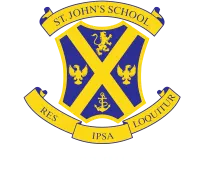
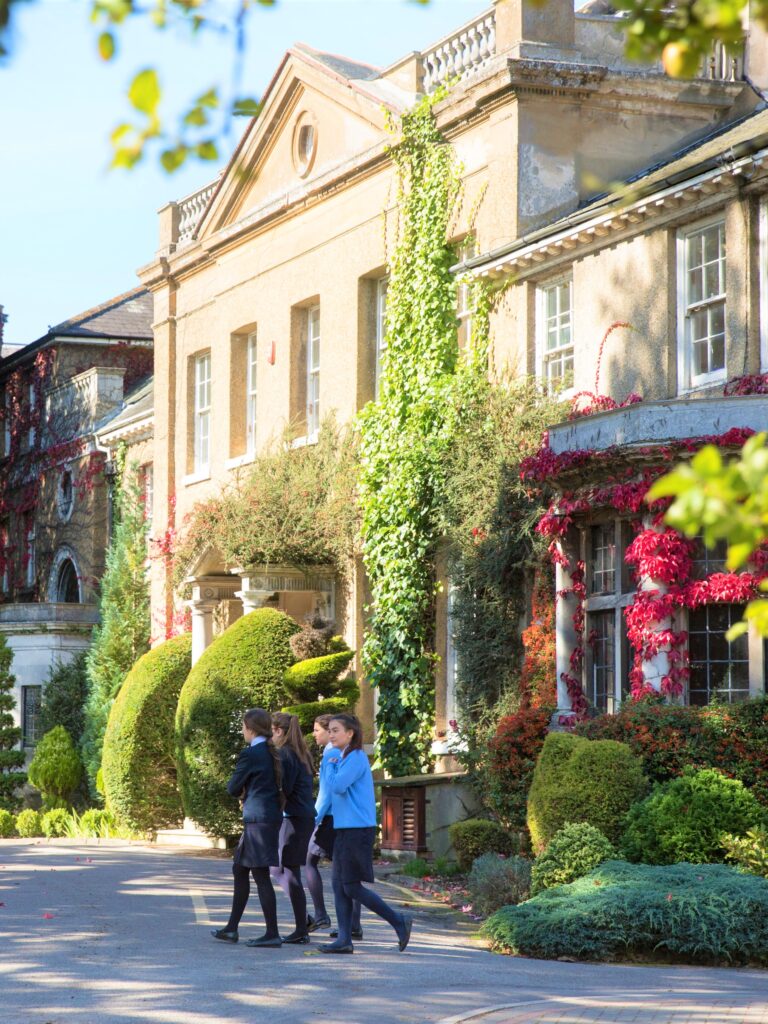

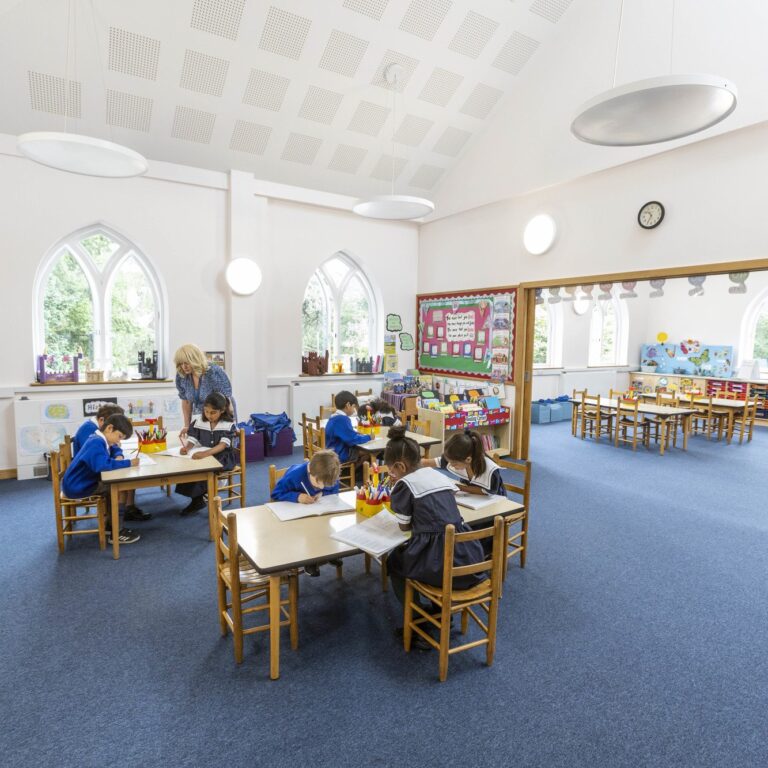
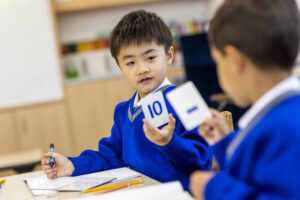 Aims
Aims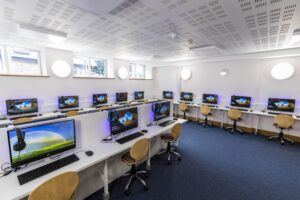
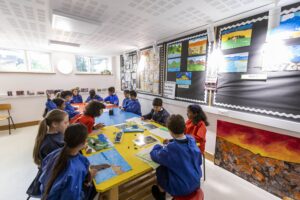 Key Stage 2
Key Stage 2